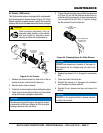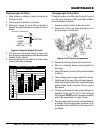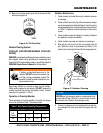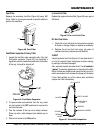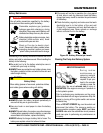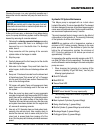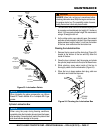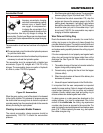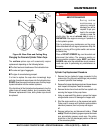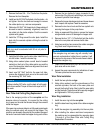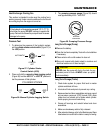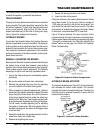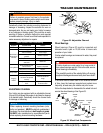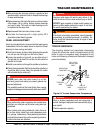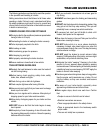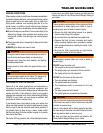
MAINTENANCE
Figure 56. Wear Plate and Cutting Ring
Changing the Concrete Cylinder Piston Cups
The urethane piston cups will occasionally require
replacement depending on the following factors.
The fluid level and cleanliness of the lubrication box.
The size and type of aggregate.
The type of concrete being pumped.
It is time to replace the cups when increasingly large
particles of sand and cement pass into the lubrication box.
DO NOT allow the cups to become so worn that they begin
to pass lubrication into the material cylinders.
If the liquid level of the lubrication box becomes to low, the
rubber cups will severely deform due to excessive heat.
Whenever replacement is due, both cylinder cups should
be replaced.
GOOD SEAL LEAKING
SHUTTLE TUBE
(INSIDE HOPPER)
RUBBER
ENERGIZER
WEAR
PLATE
CUTTING
RING
Cylinder Cup Replacement Procedure
1. Remove the two hydraulic hoses connected to the
remix motor. Plug the ports with fittings (not provided)
to prevent hydraulic hose leakage.
2. Remove the hopper discharge nipple and loosen sleeve
seal. Inspect and replace if wear is excessive.
3. Remove the two tie rod nuts and the four eyebolt nuts
securing the hopper to the pump frame.
4. Using an approved lifting device, remove the hopper
using extreme care not to damage the hopper seal.
5. Start the engine and turn on the pressure test switch.
Cycle pump in reverse until hydraulic system obtains
maximum pressure, then turn pump and engine
off.
6. Remove ignition key and disconnect battery. Think
safety! Check the hydraulic gauges on panel and make
sure accumulator pressure reads zero. One piston
should be in the fully discharged position at the end
of the concrete cylinder.
DANGER
During routine
maintenance or
removing material
blockage, you will be
required to put your
hand in the concrete
cylinders or near the
shuttle tube. You are at extreme risk of injury or
if the engine is running or if pressure is
in the hydraulic system.
Prior to performing any maintenance on the pump,
follow described lock out-tag out procedures. Stop the
engine by turning off the ignition switch and remove
the starter key.
Place a DO NOT OPERATE tag over the switch and
disconnect the battery. The pressure reading on
the accumulator pressure gauge MUST read zero.
ALWAYS make sure the accumulator circuit pressure
reads zero prior to performing any maintenance on
the pump.



